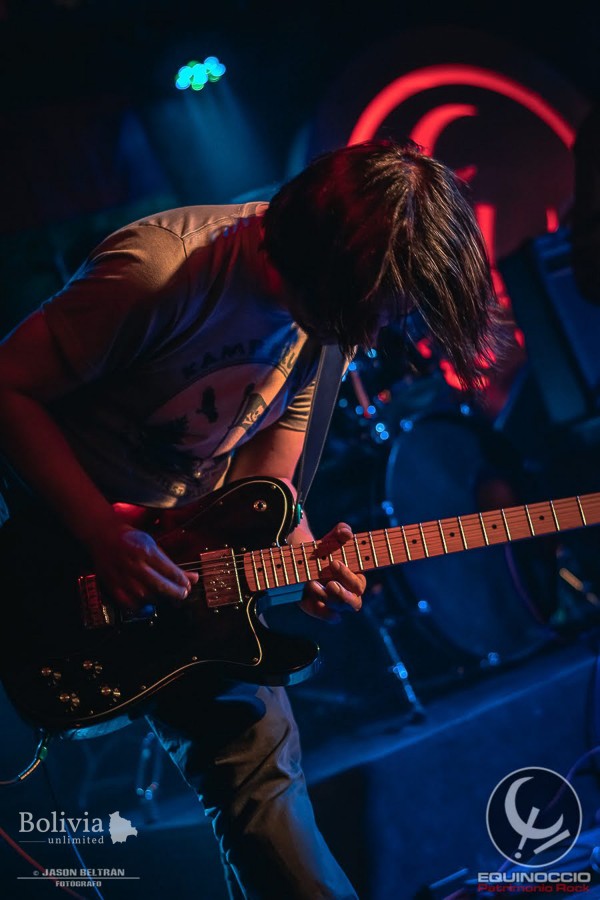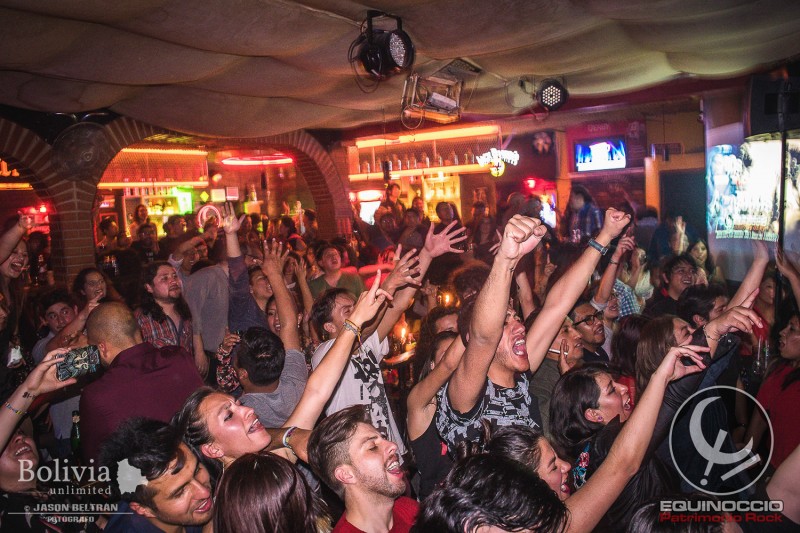EQUINOCCIO, A TEMPLE OF NATIONAL ROCK / EQUINOCCIO, TEMPLO DEL ROCK NACIONAL

29 Nov, 2020 | Enrique Claros
Photos: Jason Beltrán Chumacero
ENGLISH VERSION
Paceño heritage
The Equinoccio is called the house of rock and with good reason, but perhaps many who have enjoyed this space that has become a part of La Paz’s heritage are unaware of the fact that it was originally a more eclectic space in terms of its music. It was established on the 3rd of December, 1992 on calle Canada Strongest at the entrance of the popular San Pedro neighbourhood, back then it was in a much smaller space and setting. The mainstays on this stage were mostly acoustic artists, along with Manuel Monroy, Luis Rico, Oscar Garcia, Sobrevigencia and the best of popular Bolivian music - even the emblematic Croatian-born bluesman, Drago Dogan, performed with his (bottleneck) slides, executed using bottles of beer.
Later, just before the beginning of the millennium, it moved to Belisario Salinas street in the heart of the Sopocachi area. Here it maintained its connection with popular Bolivian music, adding other artists from different artistic fields to fill up its space. Among those, the great Banfield Puppeteer, his performance coincided with the increased popularity of the rock nights.
Equi suffered its first major mishap towards the turn of the century. Unfortunately at the end of a night, after everyone had left, the stage floor on the second floor had collapsed with all of the musical instruments on it. However, the Equinoccio would show its mettle and recover to continue its rule over the La Paz nightlife.
In the year 2000, it was set up in the space that most people associate it with today, on avenida Sanchez Lima, also in Sopocachi. This is where it gained its rock identity, being the place host the most popular bands - consecrated national rock artists such as Llegas, Octavia, Atajo, Gogo Blues and others. Through its flagship Marathon Rock (an annual competition), it saw the birth and emergence of numerous bands from the Bolivian rock scene such as Deszaire, Quirquina, Son Fusion, Los Tocayos, OZ and several more.
Being one of the main cultural spaces in the city, it provided its stage for diverse, international shows, hosting concerts by the Argentinian Litto Nebbia, David Lebon, Ataque 77, Nito Mestre and Guillermo Vadala. It also hosted the Cuban singer-songwriter Santiago Feliu, the Chileans Los Tetas as well as the Bolivia FestiJazz Internacional and the Festiblues Bolivia, which brought Vox Dei and Jimmy Rip to their stage.
The Equinoccio grew under the protection of the public and La Paz artists, but not all of its ventures were successful. Always trying to provide more spaces for music, Equi 2 was opened on avenida 6 de Agosto. This space would be short-lived, however, as the scene had a small audience at the time. It sought to expand beyond the city of La Paz, opening the Equinoccio in Cochabamba, entangling itself with the bureaucracy and administrative regulations in the city leading them to postpone its expansion.

Equi continued to push the Bolivian music scene and as it celebrates its 25 years of establishment in 2017, it created the Equinoccio a Cielo Abierto event that brought together the best of national rock - Octavia, Matamba, Wara, Deszaire, Gogo Blues, Hate, Black Jack, Illapa Raggae and La Logia.
The year 2020 came crashing into the world bringing Covid-19 with it, closing its doors to live artistic performances. The Equinoccio was no exception. Seeing the spread of the pandemic, it began to reinvent itself, in June it broadcasted live from its stage the first streaming event in Bolivia for the two nights, hosting the Grito La Paz 2020 festival. They also created Studio Equinoccio with the intention to help record bands’ concerts for internet broadcast and also expanding with ‘Food & Rock’ offering food inspired by music.
All these initiatives ground to a halt with the arrival of the fatal morning of the 4th of October. An electrical shock in its facilities caused a fire that consumed a large part of the premises and rendered the rest unusable. Fortune once again intervened, ensuring that no one was harmed, but these two recent ventures, Studio Equinoccio and Food & Rock, which were a lifeline in a very difficult year, had to stop.
The community of Equinoccio didn’t want a future without the venue. In a demonstration of solidarity, they raised funds through online performances promoted by recording studios such as Submarine Productions, alongside the production company La Otra Vereda and Alive Music Bar, among many others. This coincided with the reopening of theatres at 50% capacity, much to the joy of artists in solidarity and those who had enjoyed many nights in Equinoccio. Thanks to the support of the Municipal Secretary of Culture of La Paz and Producciones R, the Rock music cycle at the Theatre was promoted with the alongside fourteen musical groups in support - Octavia, Black Jack, Son Fusión, Oz, Astrofónicos, Deszaire, Black Dog, Sobrevigencia, Mau Montero and Tere Morales, Tierra Alta, Nación, Prana, Ruido Blanco and Hate.
The fundraiser to bring Equi from the ashes came to a close on the 28th of November and it is expected that by the 3rd of December, which will celebrate its 28th year since opening its doors, it will be ready to reopen should regulations allow it. It will be a new resurgence of the Phoenix, Equinoccio, a symbol of the La Paz night-life.
--------
VERSIÓN EN ESPAÑOL
Patrimonio paceño
El Equinoccio es llamado la casa del rock y con justa razón, pero quizás muchos jóvenes que disfrutan de este espacio convertido en patrimonio de la ciudad de La Paz desconocen que en sus orígenes era un espacio más ecléctico musicalmente, cuando nació un 3 de diciembre de 1992 en la calle Cañada Strongest al ingreso del popular barrio de San Pedro, mucho más pequeño en espacio y escenario. Se podían presenciar propuestas mayormente acústicas, junto a Manuel Monroy, Luis Rico, Oscar García, Sobrevigencia y lo mejor de la música popular boliviana, o al emblemático blusero de origen croata Drago Dogan con sus slides (bottleneck) ejecutados con un vaso con cerveza.
Posteriormente, a finales del siglo pasado se trasladó a la calle Belisario Salinas en pleno corazón de la zona de Sopocachi. Donde mantuvo su conexión con la música popular boliviana, sumando otras artes que le permitieron abarrotar su espacio para ver, por ejemplo, al gran Titiritero de Banfield, a la par que se hacían cada vez más frecuentes las noches rockeras.
El Equi sufriría un primer gran percance, a finales del siglo pasado, cuando afortunadamente la noche musical había acabado y todos se habían marchado, el suelo del escenario (un segundo piso) se vino abajo con toda la instrumentación. El Equinoccio mostraría su temple y se recuperaría para seguir reinando en la noche paceña.
Finalmente, en el año 2000 se instalaría en el que, a la fecha, es el espacio conocido por todos, en la avenida Sánchez Lima también en la zona de Sopocachi, donde lograría definitivamente su identidad rockera siendo el espacio principal que acogería a las bandas más consagradas del rock nacional como Llegas, Octavia, Atajo, Gogo Blues y otras. Mediante sus emblemáticas Marathon Rock (competencias anuales) vio nacer y surgir a numerosas bandas de la escena rockera boliviana como Deszaire, Quirquiña, Son Fusión, Los Tocayos, Oz y varias más.
Al ser uno de los principales espacios culturales de nuestra ciudad, brindó su escenario para espectáculos diversos e internacionales, acogiendo conciertos de los argentinos Litto Nebbia, David Lebón, Ataque 77, Nito Mestre y Guillermo Vadalá, del cantautor cubano Santiago Feliú, de los chilenos Los Tetas, además del Bolivia FestiJazz Internacional y del Festiblues Bolivia, que llevó a su escenario a Vox Dei y Jimmy Rip.
El Equinoccio fue creciendo al amparo del público y los artistas paceños, pero no todo fue éxito. Siempre tratando de brindar más espacios a la música, nació el Equi 2, en la avenida 6 de agosto. Sin embargo, este espacio contó con corta vida ante una escena y un público local pequeño en esos momentos. De igual modo, buscó expandirse más allá de la ciudad de La Paz, abriendo el Equinoccio en Cochabamba, enredándose con la burocracia y reglamentación administrativa de esa ciudad que lo llevó a postergar su expansión.
El Equi seguía empujando a la escena musical boliviana, es así, que el año 2017, para celebrar sus 25 años, creó el evento Equinoccio a Cielo Abierto que reunió a lo mejor del rock nacional: Octavia, Matamba, Wara, Deszaire, Gogo Blues, Hate, Black Jack, Illapa Reggae y La Logia.
Este año 2020, que se estrelló contra el mundo debido al COVID-19, cerró las puertas a la actividad artística en vivo y el Equinoccio no pudo ser la excepción.
Al ver que la pandemia se extendía, comenzó a reinventarse, en junio transmitió desde su escenario, el primer evento streaming en Bolivia, desde un espacio privado con dos noches del festival Grito La Paz 2020. Posteriormente, creó el Studio Equinoccio con el objetivo de que bandas graben conciertos para su emisión por internet y también creó la marca Food & Rock sumando una oferta gastronómica inspirada en la música.
Todas estas iniciativas se vieron truncadas con la llegada de la fatal madrugada del 4 de octubre, donde un choque eléctrico en sus instalaciones provocó un incendio que consumió gran parte del local e inutilizo el resto. La fortuna quiso nuevamente que no haya daños personales, pero sus dos recientes proyectos, Studio Equinoccio y Food & Rock que representaban una balsa de rescate en un año muy difícil tuvieron que paralizarse.
La fortaleza y el mundo Equinoccio no quiso que todo quedará sin futuro. Es así que las muestras de solidaridad para realizar recaudación de fondos, comenzaron inmediatamente con actuaciones por internet impulsadas por estudios de grabación como Submarine Productions, productoras como La Otra Vereda y espacios amigos como Alive Music Bar. Las circunstancias quisieron que las muestras de solidaridad de artistas, aquellos que tuvieron muchas noches de alegría en el Equinoccio, coincidieran con la reapertura de teatros al 50% de aforo. Gracias al apoyo de la Secretaría Municipal de Culturas de La Paz y Producciones R se impulsó el ciclo de música Rock en el Teatro con la presencia de catorce agrupaciones solidarias: Octavia, Black Jack, Son Fusión, Oz, Astrofónicos, Deszaire, Black Dog, Sobrevigencia, Mau Montero y Tere Morales, Tierra Alta, Nación, Prana, Ruido Blanco y Hate.
El ciclo para levantar al Equi de las cenizas concluyó el 28 de noviembre y se espera que, para el 3 de diciembre que cumplirá 28 años de historia, esté listo para reabrir sus puertas si las normas sanitarias lo permiten y que sea un nuevo resurgir del fénix Equinoccio, símbolo de las noches paceñas.







